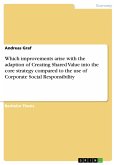Seminar paper from the year 2015 in the subject Business economics - Business Management, Corporate Governance, grade: 1,0, University of Applied Sciences Aalen, course: Corporate Strategy, language: English, abstract: In the 21st century, only the call for short-term success prevails. There is necessity of flexible reactions to changes of the economic environment on the part of companies that are standing in the bright light of public under pressure to perform. This is termed public exposure or business exposure. Depending on the point of view of stakeholders to a company, the understanding of corporate success varies strongly from maximal EPS, the ability to guarantee lifetime jobs or maximal tax proceeds - just to name some main objectives of different stakeholders.Since there are numerous stakeholders claiming interest towards a company, there is great tension between Shareholder Value and the Stakeholder Approach to strategic management, sometimes called the "Stakeholder Value" concept, and thus there are different leadership views. Further, the question which stakeholder(s) a company should focus on has not been answered consistently. However, there is empiric evidence of correlation between social engagement, or fulfillment of Corporate Social Responsibility and great financial Performance. Despite this empiric correlation, the equation correlation causality applies. The open questions are: to what extent do internal stakeholders influence the success of a corporate strategy? How can we assess whether actions taken by a company to fulfill the stakeholders´ interests were successful or not?
Hinweis: Dieser Artikel kann nur an eine deutsche Lieferadresse ausgeliefert werden.
Hinweis: Dieser Artikel kann nur an eine deutsche Lieferadresse ausgeliefert werden.








